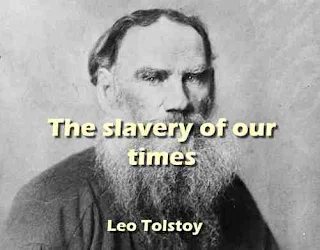The slavery of our times
Excerpt from the translator preface:
This little book shows, in a short, clear, and systematic manner, how the principle of Non- Resistance, about which Tolstoy has written so much, is related to economic and political life. The great majority of men, without knowing why, are constrained to labour long hours at tasks they dislike, and often to live in unhealthy conditions.
It is not that man has so little control over nature that to obtain a subsistence it is necessary to work in this way, but because men have made laws about land, taxes, and property, which result in placing the great bulk of the people in conditions which compel them to labour thus, or go to the workhouse, or starve.
It may be said that man's nature is so bad that were it not for these laws an even worse state of things would exist; that the laws we make and tolerate are outward and visible signs of an inward and spiritual disgrace the selfishness of man, which is the real root of the evil.
But granting that, in a sense, this may be true, we need not suppose man's nature to be immutable, and all progress forever impossible. Nor need we suppose it our duty to leave progress in the hands of some kind of a self-acting evolution, whose operations we can only watch as a passenger watches the working of a ship's engines.
We may consider the effect of the laws we have made, approve or disapprove of them, discern the direction in which it is possible to advance, and take our part in furthering or hampering that advance. Laws are made by Governments and are enforced by physical violence. We have been so long taught that it is good for some people to make laws for others, that most men approve of this. Just as " genteel " people have been known to approve of wholesale while they turned up their noses at the retail business, so people in general while disapproving of robbery and murder when done on a small scale, admire them when they are organised, and when they result in allotting most of the land on which forty million have to live to a few thousand, and in periodically sending out thousands of men to kill and to be killed. Nor are people much shocked at isolated murders, the responsibility for which is subdivided between the Queen, the hangman, the judge, jury, and officials.
To Tolstoy's mind, violence done by man to man is wrong. We cannot escape the wrongness by doing it wholesale, or by subdividing the responsibility. But what would happen if we ceased to abet it? If it were possible forcibly to oblige men to cease from using force, the selfishness which is at the root of the matter would, no doubt, burst out in some fresh form.
That is, in fact, pretty much what has happened: weary of strife and private feuds, people consented to leave to Governments the use of force. External peace among individuals has ensued, but in place of strife with club or sword, a new struggle almost as fierce is carried on under legal and commercial forms. Tolstoy's desire is not that people should be compelled to cease from violence, but that violence should become to them abhorrent, and that they should not wish to sway others more than they can be swayed by reason and by sympathy.
Were that accomplished, surely we may trust that good would come of good, as now ill comes of ill. At any rate, as Tolstoy shows, there is no other path of advance. We can neither revert to the belief that to use violence is a divine right of kings, nor can we maintain the current belief that to do so is a divine right of majorities. To be subjected by force to a rule we disapprove of is slavery, and we are all slaves or slave-owners (sometimes both together) as long as our society bases itself on violence.
Download The slavery of our times - PDF 3.3 MB


